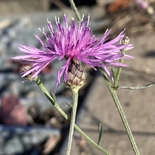Community Outreach
In this issue we are again incorporating a yellow page listing for our business members. It’s our opportunity to showcase their support of our efforts in promoting the use of native plant species in natural landscaping. If you know of a business in your area that actively promotes the use of native landscaping, tell them about Wild Ones and encourage them to join at the business level. Part of our mission is to develop a more meaningful relationship with each of our communities. One way to do this is to expand our business memberships. So go out there and talk to the community about your goals on native
landscaping. If you need a brochure to steady your nerves, give the national office a call, toll-free at (920) 730-9386, and one or more will be sent your way. Just remember, you are not asking for something for yourself, you are petitioning on behalf of a cause you believe in. Think of it as doing a good deed. That usually helps calm my nerves.
Sharing in the Trenches
Fox Valley Area Chapter (FVAC) recently received a big thank you from the Imago Earth Center in Cincinnati. Dan Elbert, of the nature center, was seeking assistance with establishing plant rescue procedures for the center’s volunteers. After surfing around on the Internet for a bit, he came across FVAC’s pages on the national web site and subsequently contacted their dig coordinator, Donna VanBuecken.
Wild Ones Enters the Credit Card Age
Did you know that Wild Ones is now accepting credit card payments? You can purchase items from the Wild Store or renew your membership via the Internet and your handy little credit card. It couldn’t get much easier.
Nominate Yourself to the National Board
Have you ever given any thought to participating in the business of running national Wild Ones? Well here’s your chance. Wild Ones is seeking nominations for board members. We also need members for national committees, such as finance and membership development. Do you have any experience writing a grant request? Would you like some?
The national board meets quarterly, usually in a city that has a Wild Ones chapter. If gallivanting around the country while paying your own way doesn’t appeal to you, keep in mind that all meetings (board and committee) are also accessible via toll-free conference calls. So you’ll have the option of participating from the comfort of your own home. Contact the national office at [email protected] for more information about volunteering your time for Wild Ones.
Knapweed Nightmare
Knapweed is a problem throughout western rangeland, and infests some 5 million acres in Montana alone. Dave Burch, the state’s weed coordinator, estimates spotted knapweed costs the state’s economy $42 million a year. Early detection of the weed makes eradication easier. The problem is that humans just are not very good at spotting the young growth of spreading knapweed.

Spotted Knapweed(Centaurea stoebe)
But dogs and other animals that rely heavily on their sense of smell for survival have the advantage of being macrosmatic. Given enough parts per million, they can home in on a specific set of odor molecules, within an admixture of multiple odors, and track those particular odor molecules.
Desperate humans are considering training dogs to uncover young stands of knapweed. Nightmare, a dog that is half wolf, has been trained to follow the scent of knapweed. Trials are scheduled to begin this spring.
Researchers say Knapweed Nightmare will be unleashed on 10-acre range land parcels with known areas of spotted knapweed. The dog will wear a Global Positioning System flash card to track her movements, allowing researchers to map areas where she might stop to dig at a scent.
If the project proves successful, researchers and Montana land managers can see dogs one day hunting down the weeds on rangeland, joining anti-weed methods that include herbicide, goats, and insects.
